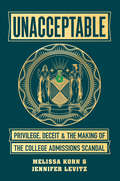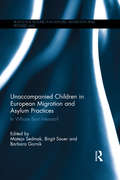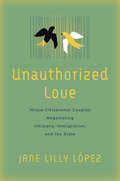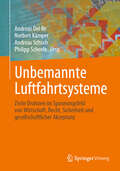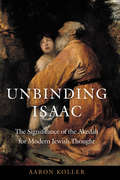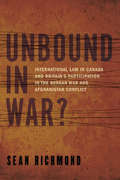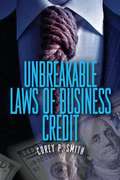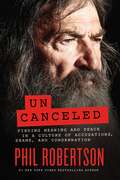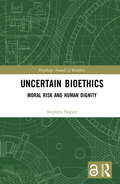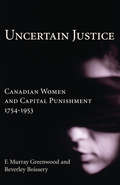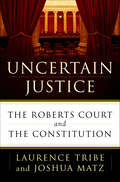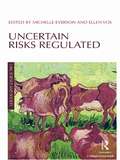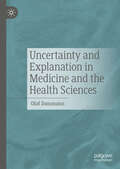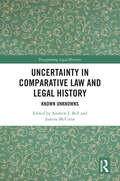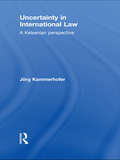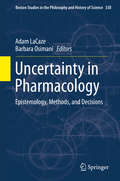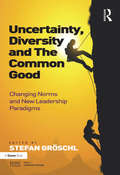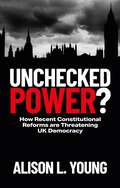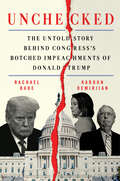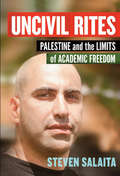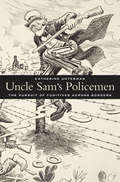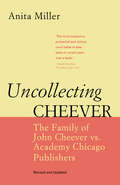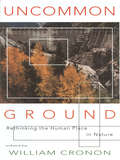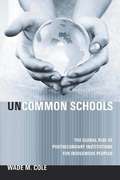- Table View
- List View
Unacceptable: Privilege, Deceit & the Making of the College Admissions Scandal
by Melissa Korn Jennifer LevitzAn explosive true crime story of fraud, corruption, greed, celebrity, and justice in the cheating scandal that shattered the myth of meritocracy.The largest college admissions scam ever prosecuted by the Department of Justice broke on March 12, 2019, sending shock waves through American schools and families. In Unacceptable, veteran Wall Street Journal reporters Melissa Korn and Jennifer Levitz trace the wiretapped calls, covert payments, and blatant deceit that brought the feds to Beverly Hills mansions and Upper East Side apartments, their residents all linked by one man: college whisperer and ultimate hustler Rick Singer. The shocking tale at the heart of Unacceptable is how, over decades, the charismatic Singer easily exploited a system rigged against regular people. Exploring the status obsession that seduced entitled parents in search of an edge, Korn and Levitz detail a scheme that eventually entangled more than fifty conspirators—a catalog of wealth and privilege that included CEOs, lawyers, real-estate developers, financiers, and famous actresses, mingling in jail cells and courtrooms. Detailing Singer&’s steady rise and dramatic fall, woven with stories of key players in the case, Unacceptable exposes the ugly underbelly of elite college admissions as a game with no rule book—paid-off proctors and storied college coaches turning a blind eye, helicopter parents and coddled teens spinning lies—opening loopholes and side doors into America&’s most exclusive institutions.
Unaccompanied Children in European Migration and Asylum Practices: In Whose Best Interests? (Routledge Research in Asylum, Migration and Refugee Law)
by Mateja Sedmak Birgit Sauer Barbara GornikUnaccompanied minor migrants are underage migrants, who for various reasons leave their country and are separated from their parents or legal/customary guardians. Some of them live entirely by themselves, while others join their relatives or other adults in a foreign country. The concept of the best interests of a child is widely applied in international, national legal documents and several guidelines and often pertains to unaccompanied minor migrants given that they are separated from parents, who are not able to exercise their basic parental responsibilities. This book takes an in-depth look at the issues surrounding the best interests of the child in relation to unaccompanied minor migrants drawing on social, legal and political sciences in order to understand children’s rights not only as a matter of positive law but mainly as a social practice depending on personal biographies, community histories and social relations of power. The book tackles the interpretation of the rights of the child and the best interests principle in the case of unaccompanied minor migrants in Europe at political, legal and practical levels. In its first part the book considers theoretical aspects of children’s rights and the best interests of the child in relation to unaccompanied minor migrants. Adopting a critical approach to the implementation of the Convention of Rights of a Child authors nevertheless confirm its relevance for protecting minor migrants’ rights in practice. Authors deconstruct power relations residing within the discourses of children’s rights and best interests, demonstrating that these rights are constructed and decided upon by those in power who make decisions on behalf of those who do not possess authority. Authors further on explore normative and methodological aspects of Article 3 of the Convention on the Rights of a Child and its relevance for asylum and migration legislation. The second part of the book goes on to examine the actual legal framework related to unaccompanied minor migrants and implementation of children’s’ rights and their best interests in the reception, protection, asylum and return procedures. The case studies are based on from the empirical research, on interviews with key experts and unaccompanied minor migrants in Austria, France, Slovenia and United Kingdom. Examining age assessment procedures, unaccompanied minors’ survivals strategies and their everyday life in reception centres the contributors point to the discrepancy between the states’ obligations to take the best interest of the child into account when dealing with unaccompanied minor migrants, and the lack of formal procedures of best interest determination in practice. The chapters expose weaknesses and failures of institutionalized systems in selected European countries in dealing with unaccompanied children and young people on the move.
Unauthorized Love: Mixed-Citizenship Couples Negotiating Intimacy, Immigration, and the State
by Jane Lilly LópezA rich, narrative exploration of the ways love defies, survives, thrives, and dies as lovers contend with US immigration policy. For mixed-citizenship couples, getting married is the easy part. The US Supreme Court has confirmed the universal civil right to marry, guaranteeing every couple's ability to wed. But the Supreme Court has denied that this right to marriage includes married couples' right to life, liberty, and the pursuit of happiness on US soil, creating a challenge for mixed-citizenship couples whose individual-level rights do not translate to family-level protections. While US citizens can extend legal inclusion to their spouses through family reunification, they must prove their worthiness and the worthiness of their love before their relationship will be officially recognized by the state. In Unauthorized Love, Jane López offers a comprehensive, critical look at US family reunification law and its consequences as experienced by 56 mixed-citizenship American couples. These couples' stories––of integration and alienation, of opportunity and inequality, of hope and despair––make tangible the consequences of current US immigration laws that tend to favor Whiteness, wealth, and heteronormativity, as well as the individual rather than the family unit, in awarding membership and official belonging. In examining the experiences of couples struggling to negotiate intimacy under the constraints of immigration policy, López argues for a rethinking of citizenship as a family affair.
Unbemannte Luftfahrtsysteme: Zivile Drohnen im Spannungsfeld von Wirtschaft, Recht, Sicherheit und gesellschaftlicher Akzeptanz
by Andreas Del Re Norbert Kämper Andreas Schoch Philipp ScheeleDrohnen sind längst von einer vielversprechenden Zukunftstechnologie zu einer etablierten Größe am Himmel geworden. Durch die zunehmenden Möglichkeiten ziviler Nutzung nimmt ihre Präsenz dabei immer noch zu, wodurch Fragen aufgeworfen werden, die schon heute beantwortet werden müssen. Neben den obligatorischen rechtlichen Fragen geht es dabei auch um den gesellschaftlichen Einfluss, den neue Technologie seit je her mit sich bringen. Welche rechtlichen Rahmenbedingungen sind nötig, wenn immer mehr Drohnen sich den Luftraum mit anderen Luftverkehrsteilnehmern teilen? Wie ist es um die Sicherheit, auch IT-Sicherheit bestellt, wenn zunehmend Drohnen über der Bevölkerung schweben? Welche ethischen Herausforderungen bringen unbemannte Systeme mit sich, die zunehmend autonom operieren? All jenen Fragen widmen sich die Autoren dieses Sammelbandes und schaffen so neue Zugänge und Perspektiven auf das Zukunftsthema der Unbemannten Luftfahrtsysteme.
Unbinding Isaac: The Significance of the Akedah for Modern Jewish Thought
by Aaron KollerUnbinding Isaac takes readers on a trek of discovery for our times into the binding of Isaac story. Nineteenth-century Danish philosopher Søren Kierkegaard viewed the story as teaching suspension of ethics for the sake of faith, and subsequent Jewish thinkers developed this idea as a cornerstone of their religious worldview. Aaron Koller examines and critiques Kierkegaard&’s perspective—and later incarnations of it—on textual, religious, and ethical grounds. He also explores the current of criticism of Abraham in Jewish thought, from ancient poems and midrashim to contemporary Israel narratives, as well as Jewish responses to the Akedah over the generations. Finally, bringing together these multiple strands of thought—along with modern knowledge of human sacrifice in the Phoenician world—Koller offers an original reading of the Akedah. The biblical God would like to want child sacrifice—because it is in fact a remarkable display of devotion—but more than that, he does not want child sacrifice because it would violate the child&’s autonomy. Thus, the high point in the drama is not the binding of Isaac but the moment when Abraham is told to release him. The Torah does not allow child sacrifice, though by contrast, some of Israel&’s neighbors viewed it as a religiously inspiring act. The binding of Isaac teaches us that an authentically religious act cannot be done through the harm of another human being. Download a Study Guide
Unbound in War?: International Law in Canada and Britain’s Participation in the Korean War and Afghanistan
by Sean RichmondIn Unbound in War?, Sean Richmond examines the influence and interpretation of international law in the use of force by two important but understudied countries, Canada and Britain, during two of the most significant conflicts since 1945, namely the Korean War and the Afghanistan Conflict. Through innovative application of sociological theories in International Relations (IR) and International Law (IL), and rigorous qualitative analysis of declassified documents and original interviews, the book advances a two-pronged argument. First, contrary to what some dominant IR perspectives might predict, international law can play four underappreciated roles when states use force. It helps constitute identity, regulate behaviour, legitimate certain actions, and structure the development of new rules. However, contrary to what many IL approaches might predict, it is unclear whether these effects are ultimately attributable to an obligatory quality in law. This ground-breaking argument promises to advance interdisciplinary debates and policy discussions in both IR and IL.
Unbreakable Laws of Business Credit
by Corey P. SmithThe Unbreakable Laws of Business Credit is an entrepreneurs guide to establishing any corporate structure and build great business credit at the same time. It reveals how to accumulate start up capital for any business without using a personal guarantee and step by step instructions on applying for corporate credit cards. Learn some of the secrets about using, buying and establishing Shelf Corporation.
Uncanceled: Finding Meaning and Peace in a Culture of Accusations, Shame, and Condemnation
by Phil RobertsonWin the War for Your Own IntegrityAfter Phil Robertson quoted Scripture in an interview with a national magazine, his hit show, Duck Dynasty, put him on &“indefinite hiatus.&” Phil immediately knew what had happened: he had become a target of cancel culture.Since that time, Phil has spoken out against public shaming, strategic campaigns to get Bible-believing employees fired, and other tactics that are wreaking havoc in our society. In a deeply divided country, with so many bent on condemning and silencing others, Phil calls for us to carry out the unifying message of Jesus Christ.In Uncanceled, Phil shares his own experiences with cancel culture as heencourages us to turn to Scripture as we navigate politics, personal conversations, and new cultural norms;helps us see the psychological and political motivations behind silencing conservative voices;reminds us that the goal is not to convince others to like us but to win the war for our own integrity by refusing to bow down to the god of political correctness; andshows us how to trade retaliation for the love and forgiveness that God offers.Uncanceled is a blueprint for standing up for the truth of Jesus Christ in a culture that has forgotten how to have respectful conversations. As Phil reminds us, when we embrace the truth that Jesus Christ already paid an enormous debt to cancel our sins, we find a path to redemption, a way to forgiveness, and a means for godly connection.
Uncertain Bioethics: Moral Risk and Human Dignity (Routledge Annals of Bioethics)
by Stephen NapierBioethics is a field of inquiry and as such is fundamentally an epistemic discipline. Knowing how we make moral judgments can bring into relief why certain arguments on various bioethical issues appear plausible to one side and obviously false to the other. Uncertain Bioethics makes a significant and distinctive contribution to the bioethics literature by culling the insights from contemporary moral psychology to highlight the epistemic pitfalls and distorting influences on our apprehension of value. Stephen Napier also incorporates research from epistemology addressing pragmatic encroachment and the significance of peer disagreement to justify what he refers to as epistemic diffidence when one is considering harming or killing human beings. Napier extends these developments to the traditional bioethical notion of dignity and argues that beliefs subject to epistemic diffidence should not be acted upon. He proceeds to apply this framework to traditional and developing issues in bioethics including abortion, stem cell research, euthanasia, decision-making for patients in a minimally conscious state, and risky research on competent human subjects.
Uncertain Causation in Tort Law
by Diego M. Papayannis Martín-Casals, Miquel and Papayannis, Diego M. Miquel Martín-CasalsThis discussion of causal uncertainty in tort liability adopts a comparative approach in order to highlight the important normative, epistemological and procedural implications of the various proposed solutions. Occupying a middle ground between the legal perspective and the philosophical views that are at stake when it comes to the resolution of tort law cases in a context of causal uncertainty, the arguments will be of great interest to legal scholars, legal philosophers and advanced tort law students.
Uncertain Justice: Canadian Women and Capital Punishment, 1754-1953
by F. Murray Greenwood Beverley BoisseryIn 1754 Eleanor Powers was hung for a murder committed during a botched robbery. She was the first woman condemned to die in Canada, but would not be the last.In Uncertain Justice, Beverley Boissery and Murray Greenwood portray a cast of women characters almost as often wronged by the law as they have wronged society. Starting with the Powers trial and continuing to the not-too-distant past, the authors expose the patriarchal values that lie at the core of criminal law, and the class and gender biases that permeate its procedures and applications.The writing style is similar to that of a popular mystery: "Harriet Henry lay dead. Horribly and indubitably. Her body sprawled against the bed, the head twisted at a grotesque angle. Foam engulfed the grinning mouth." Scholarly analysis combines with the narrative to make Uncertain Justice a fascinating and engaging read.There is a wealth of information about the emerging and evolving legal system and profession, the state of forensic science, the roles of juries, and the political turmoil and growing resistance to a purely class-based aristocratic form of government.
Uncertain Justice: The Roberts Court and the Constitution
by Laurence Tribe Joshua Matz“Illuminating. . . . [Tribe and Matz] offer well-crafted overviews of key cases decided by the Roberts Court [and] chart the Supreme Court’s conservative path.” —Chicago TribuneFrom Citizens United to its momentous rulings regarding Obamacare and gay marriage, the Supreme Court under Chief Justice John Roberts has profoundly affected American life. Yet the court remains a mysterious institution, and the motivations of the nine men and women who serve for life are often obscure. In Uncertain Justice, Laurence Tribe and Joshua Matz show the surprising extent to which the Roberts Court is revising the meaning of our Constitution.Political gridlock, cultural change, and technological progress mean that the court’s decisions on key topics—including free speech, privacy, voting rights, and presidential power—could be uniquely durable. Acutely aware of their opportunity, the justices are rewriting critical aspects of constitutional law and redrawing the ground rules of American government. Tribe—one of the country’s leading constitutional lawyers—and Matz dig deeply into the court’s rulings, stepping beyond tired debates over judicial “activism” to draw out hidden meanings and silent battles. The undercurrents they reveal suggest a strikingly different vision for the future of our country, one that is sure to be hotly debated.Filled with original insights and compelling human stories, Uncertain Justice illuminates the most colorful story of all—how the Supreme Court and the Constitution frame the way we live.“A brilliantly layered account . . . Filled with memorable stories and striking references to literature, baseball and popular culture, this book is a joy to read from start to finish.” —Doris Kearns Goodwin, Pulitzer Prize winner and #1 New York Times–bestselling author of Team of Rivals“Well-written and highly readable . . . The strength of the book is its painstaking explanation of all sides of the critical cases, giving full voice and weight to conservative and liberal views alike.” —The Washington Post
Uncertain Risks Regulated (Law, Science and Society)
by Ellen Vos Michelle EversonUncertain Risks Regulated compares various models of risk regulation in order to understand how these systems shape the relationship between law and science, and how they attempt to overcome public distrust in science-based decision-making. The book contributes to the ongoing debate relating to uncertainty and risks - and the difficulties faced by the European Union in particular - in regulating theses issues, taking account of both national and international constraints. The term 'uncertain risk' is comparable with notions of hazard and indeterminate risk, as deployed within the social sciences; but it also aims to capture the modern regulatory reality that a non-quantifiable hazard must still be addressed by society, law and its regulators. Decisions must be taken in the face of uncertainty. And, whilst it is not possible to provide clear cut models of risk regulation, in focusing on regulatory practices at a national, EU and international level, the contributors to this volume aim to use fact finding as a core instrument of learning for risk regulation.
Uncertainty and Explanation in Medicine and the Health Sciences
by Olaf DammannThis book offers a comprehensive account of how uncertainty is tackled in medicine and the health sciences. Olaf Dammann explores recent accounts of medicine as ineffective and suggests that the impression that medicine does not achieve its goal is, at least in part, due to the aleatoric (natural) uncertainty of biomedical processes and the subsequent epistemic (cognitive) uncertainty of those who desire solid information about such processes. Dammann shows how concepts like inference, explanation, and causometry help mitigate this disconnect. He points toward the possibility that some of the statistically rigid and formalized approaches (such as the randomized controlled trial as the gold standard for the justification of medical interventions) might better be replaced by approaches that emphasize the coherence of evidence and the people’s needs for helpful health interventions (auxiliarianism).
Uncertainty in Comparative Law and Legal History: Known Unknowns (Transforming Legal Histories)
by Andrew J. Bell and Joanna McCunnLaws are imposed on facts. But what is the law to do when its rules for establishing facts do not—because they cannot—produce a satisfactory answer? Scenarios that raise this intractable uncertainty problem have been treated as isolated concerns, but are in fact endemic across legal systems. They can cross jurisdictional and doctrinal boundaries, have recurred throughout history, and demand creative thinking from those faced with them. This book explores the law’s understandings of and responses to such situations from a comparative historical perspective. It investigates how the law has framed these most difficult problems of uncertainty; dealt with uncertainty’s often unclear boundaries; and developed a broad range of different responses to solve or avoid it, across doctrine, time, and jurisdiction. The work examines a selection of key uncertainty problems across private law as elements of a singular uncertainty issue endemic in legal systems. This analysis will be of interest to historians and comparatists, but also to doctrinal, theoretical, and other scholars and practitioners. The analysis leaves us better informed and better equipped for dealing with future scenarios where uncertainty arises, including insights beyond national and doctrinal confines.
Uncertainty in International Law: A Kelsenian Perspective
by Jörg KammerhoferRe-engaging with the Pure Theory of Law developed by Hans Kelsen and the other members of the Viennese School of Jurisprudence, this book looks at the causes and manifestations of uncertainty in international law. It considers both epistemological uncertainty as to whether we can accurately perceive norms in international law, and ontological problems which occur inter alia where two or more norms conflict. The book looks at these issues of uncertainty in relation to the foundational doctrines of public international law, including the law of self-defence under the United Nations Charter, customary international law, and the interpretation of treaties. In viewing international law through the lens of Kelsen’s theory Jörg Kammerhofer demonstrates the importance of the theoretical dimension for the study of international law and offers a critique of the recent trend towards pragmatism and eclecticism in international legal scholarship. The unique aspect of the monograph is that it is the only book to apply the Pure Theory of Law as theoretical approach to international law, rather than simply being a piece of intellectual history describing it. This book will of great interest to students and scholars of public international law, legal theory and jurisprudence.
Uncertainty in Pharmacology: Epistemology, Methods, and Decisions (Boston Studies in the Philosophy and History of Science #338)
by Adam LaCaze Barbara OsimaniThis volume covers a wide range of topics concerning methodological, epistemological, and regulatory-ethical issues around pharmacology. The book focuses in particular on the diverse sources of uncertainty, the different kinds of uncertainty that there are, and the diverse ways in which these uncertainties are (or could be) addressed. Compared with the more basic sciences, such as chemistry or biology, pharmacology works across diverse observable levels of reality: although the first step in the causal chain leading to the therapeutic outcome takes place at the biochemical level, the end-effect is a clinically observable result—which is influenced not only by biological actions, but also psychological and social phenomena. Issues of causality and evidence must be treated with these specific aspects in mind. In covering these issues, the book opens up a common domain of investigation which intersects the deeply intertwined dimensions of pharmacological research, pharmaceutical regulation and the related economic environment. The book is a collective endeavour with in-depth contributions from experts in pharmacology, philosophy of medicine, statistics, scientific methodology, formal and social epistemology, working in constant dialogue across disciplinary boundaries.
Uncertainty, Diversity and The Common Good: Changing Norms and New Leadership Paradigms
by Stefan GröschlBecause of a management model emphasizing standardization and a one-size-fits-all approach, the previous good health of firms depended on economic performance and maximizing shareholder value. The enduring financial crisis and the ensuing leadership void have forced us all to reconsider the rules of the game and to take into account economic and social factors, in order to address the needs of an unpredictable world. In Uncertainty, Diversity and The Common Good, contributors from leading academic institutions around the World discuss different models of socially responsible global leadership. Their perspectives embrace philosophy; sociology; psychology; ecological and environmental economics; management; and entrepreneurship. Together they explore unpredictability and how being responsible for social as well as economic outcomes requires intelligences that enable managers to adapt and to develop a sustainable, lasting and consistent managerial approach. Working with local communities, integrating minorities, and redistributing wealth, they say, requires a new model of socially responsible leadership that brings together dimensions that are incompatible within existing paradigms. This book indicates what new paradigms might look like, with particular regard to the issue of diversity as an asset with which to confront uncertainty. Case studies tell of leaders working with diversity to create social change and new visions of leadership that are impacting social and cultural norms. This leads to discussion of the nature and diversity of leadership itself which will be helpful to academic researchers and higher level students, as well as policy makers and practitioners.
Unchecked Power?: How Recent Constitutional Reforms Are Threatening UK Democracy
by Alison L. YoungIs the government really acting for the people? Or does this rhetoric simply justify an executive power-grab? For some, Boris Johnson’s premiership epitomised how far the UK’s democracy has been captured by populism and the Prime Minister seemed more concerned about fulfilling the wishes of the British people than with following the rules or listening to Parliament. Events like ‘Partygate’ grabbed the headlines. Criticisms of Boris Johnson’s actions eventually led to his resignation and replacement as leader of his party and Prime Minister. Some feel that this shows that the UK’s constitution is healthy, with checks and balances in place to prevent any possible abuse of power. While these events attracted much media attention, other constitutional changes have been taking place with little public awareness. These have strengthened governmental powers and weakened political and legal checks over governmental actions. Deliberation is being replaced by rhetoric and principles of good government no longer seem to restrain the actions of those in power. Alison Young provides the first consolidated account of these changes, arguing that the UK is currently on a constitutional cliff-edge which endangers democracy and good constitutional government. She argues that more is needed to shore up the UK’s post-Brexit constitution to prevent it collapsing into a system of unchecked power.
Unchecked: The Untold Story Behind Congress's Botched Impeachments of Donald Trump
by Rachael Bade Karoun DemirjianA revealing, behind-the-scenes examination of how Congress twice fumbled its best chance to hold accountable a president many considered one of the most dangerous in American history. The definitive—and only—insider account of both Trump impeachments, as told by the two reporters on the front lines covering them for The Washington Post and Politico.In a riveting account that flips the script on what readers think they know about the two impeachments of Donald Trump, Rachael Bade and Karoun Demirjian reveal how—and why—congressional oversight failed when it was needed most.Unchecked weaves a vivid narrative of how House Democrats under the lead of a cautious speaker, Nancy Pelosi, hesitated for months to stand up to Trump—and then pulled punches in their effort to oust him in a misguided effort to protect themselves politically. What they left on the cutting room floor would come back to haunt them, as Republicans seized on their missteps to whip an uneasy GOP rank-and-file into line behind Donald Trump, abandoning their scruples to defend a president who some privately believed had indeed abused his power.Even after Trump incited a mob to violently attack the Capitol—a day the authors recount in minute-by-minute, stunning detail — Democrats pressured their own investigators to forego a thorough investigation in the name of safeguarding the Biden agenda. And Republicans, fearful of repelling a base they needed for re-election, missed their best moment to turn their backs on a leader they secretly agreed was destructive to democracy.Sourced from hundreds of interviews with all the key players, the authors of Unchecked pull back the curtain on how both parties pursued political expediency over fact-finding. The end result not only emboldened Trump, giving him room for a political comeback, but also undermined Congress by rendering toothless their most powerful check on a president: the power of impeachment. A dramatic and at times crushing work of investigative reporting, Unchecked is both a gripping page-turner of political intrigue and a detailed case study for historians and political scientists searching for answers about the unravelling of checks and balances that have governed American democracy for centuries.
Uncivil Rites
by Steven SalaitaIn the summer of 2014, renowned American Indian studies professor Steven Salaita had his appointment to a tenured professorship revoked by the board of trustees of the University of Illinois at Urbana-Champaign. Salaita's employment was terminated in response to his public tweets criticizing the Israeli government's summer assault on Gaza.Salaita's firing generated a huge public outcry, with thousands petitioning for his reinstatement, and more than five thousand scholars pledging to boycott UIUC. His case raises important questions about academic freedom, free speech on campus, and the movement for justice in Palestine.In this book, Salaita combines personal reflection and political critique to shed new light on his controversial termination. He situates his case at the intersection of important issues that affect both higher education and social justice activism.ependent scholar.
Uncle Sam's Policemen: The Pursuit of Fugitives across Borders
by Katherine UntermanExtraordinary rendition--abducting criminal suspects around the world--has been criticized as an unprecedented expansion of U.S. policing. But America's pursuit of fugitives beyond its borders predates the Global War on Terror. Katherine Unterman shows that the extension of manhunts into foreign lands formed an important chapter in American empire.
Uncollecting Cheever: The Family of John Cheever vs. Academy Chicago Publishers
by Anita MillerThe story of how little Academy Chicago Publishers (co-owned by the author and her husband, Jordan Miller) tried to publish the late John Cheever's uncollected short stories, and was blocked from doing so by Cheever's family, is now a familiar part of publishing lore (and law).
Uncommon Ground: Rethinking the Human Place in Nature
by William CrononA controversial, timely reassessment of the environmentalist agenda by outstanding historians, scientists, and critics. In a lead essay that powerfully states the broad argument of the book, William Cronon writes that the environmentalist goal of wilderness preservation is conceptually and politically wrongheaded. Among the ironies and entanglements resulting from this goal are the sale of nature in our malls through the Nature Company, and the disputes between working people and environmentalists over spotted owls and other objects of species preservation. The problem is that we haven't learned to live responsibly in nature. The environmentalist aim of legislating humans out of the wilderness is no solution. People, Cronon argues, are inextricably tied to nature, whether they live in cities or countryside. Rather than attempt to exclude humans, environmental advocates should help us learn to live in some sustainable relationship with nature. It is our home.
Uncommon Schools
by Wade M. ColePostsecondary institutions for indigenous peoples emerged in the late 1960s, just as other special purpose colleges based on gender or race began to close. What accounts for the emergence of these distinctive institutions? Though indigenous students are among the least populous, the poorest, and the most educationally disadvantaged in the world, they differ from most other racial, ethnic, cultural, and linguistic minorities by virtue of their exceptional claims to sovereignty under international and domestic law. Uncommon Schools explores the emergence of postsecondary institutions for indigenous peoples worldwide, with a focus on developments in the United States, Canada, Australia, and New Zealand. Providing the opportunity to examine larger social, political, and legal processes, it traces the incorporation of indigenous peoples into nation-states, the rise of a global indigenous rights movement, and the "massification" of postsecondary education while investigating the variety of ways these culturally relevant colleges differ from each other and from other postsecondary institutions.
